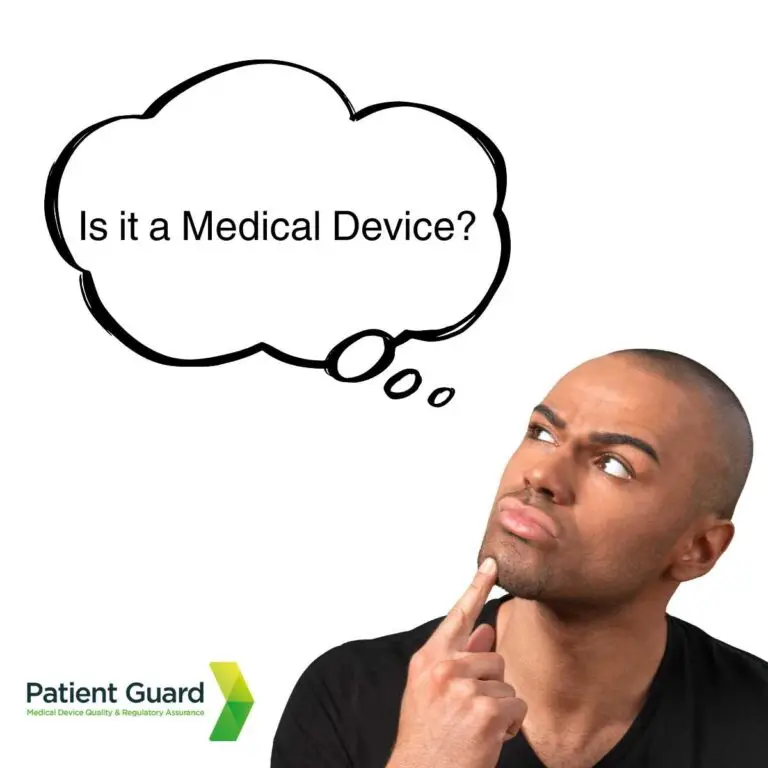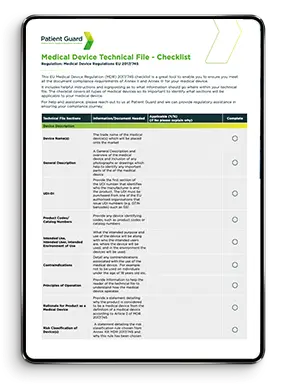Post Market Clinical Follow-up (PMCF)
Post Market Clinical Follow-up (PMCF) is a requirement for Medical Device Manufacturers as part of Post Market Surveillance (PMS) activities

- What is Post Market Clinical Follow-up?
- What are the objectives of PMCF?
- PMCF Plan
- PMCF Survey
- PMCF Study
- PMCF Report
- How Can Patient Guard Help?
- PMCF - Strategic Planning
- PMCF - Protocol Development
- PMCF - Data Collection & Analysis
- Regulatory compliance
- Training and Education
- More about Medical Device Compliance and Regulations
What is Post Market Clinical Follow-up?
Ongoing medical device compliance necessitates active engagement in Post Market Clinical Follow-up (PMCF). Dating back to the EU medical device directives, PMCF has been mandatory for manufacturers for a number of years. With the enforcement of the EU Medical Device Regulations (MDR) EU 2017/745, PMCF requirements have been notably reinforced. Consequently, nearly all medical device manufacturers must conduct PMCF activities when placing their products on the EU market.
PMCF, a vital aspect of Post-Market Surveillance (PMS) alongside Vigilance processes, proactively collects data under EU MDR. It gathers and assesses clinical data on device safety and performance during normal use. According to MDR Annex XIV Part B, PMCF must operate continuously throughout a device’s lifetime. Medical device manufacturers must grasp PMCF requirements within the EU MDR regulatory framework.
What are the Objectives of PMCF?
As outlined in Annex XIV Part B of the MDR, PMCF serves overall objectives, such as assessing device safety and performance. Specific MDR objectives include identifying residual risks, updating Clinical Evaluation, detecting emerging risks, confirming overall safety and performance, and uncovering systematic misuse.
PMCF studies and surveys, documented in a PMCF Plan, contribute to a PMCF Report within the Clinical Evaluation Report (CER). Designing these studies requires expertise to align with device characteristics, target patient, user population, risk classification, and complexity.
For each medical device on the market, a dedicated PMCF plan must be established, documented in the post-market surveillance section of the technical file. A yearly PMCF report, gathering ongoing real-world data, is essential for maintaining device safety and performance.
PMCF Plan
Crafting a comprehensive PMCF plan for the medical device is crucial, and it must align with EU MDR 2017/745 and MDCG guidelines. The plan, organized into seven sections, outlines how the manufacturer will collect real-world clinical data based on identified residual risks in the Risk Management File and Clinical Evaluation Report. Designing a PMCF study requires consideration of device characteristics, target patient and user population, risk classification, and complexity. Therefore, expertise in clinical investigation design is essential to ensure suitability for the intended purpose. Keeping the PMCF plan current is also imperative.
PMCF Survey
PMCF surveys, also known as ‘end user’ surveys, effectively gather post-market clinical data from healthcare professionals and patients. These surveys involve tailored questions, considering the device’s nature and the target population.
Unlike typical ‘marketing’ surveys, PMCF surveys serve as clinical data generation tools. The survey’s nature varies; general surveys, suitable for lower-risk devices, collect user feedback retrospectively. For high-risk devices, manufacturers should opt for specific survey activities.
General surveys often have a retrospective design, prompting end-users to recall device information. Specific surveys, whether patient-level or case-specific, can be prospective, yielding higher-quality clinical data through patient outcome and clinical indication data.
PMCF Study
Clinical Investigations, encompassing medical device registries and PMCF surveys, must align with legislative requirements for medical research. MDR Annex XV specifies design, conduct, and reporting standards, with compliance to GDPR for data collection. Adherence to ISO 14155:2020 and GCP guidelines is imperative.
PMCF investigations require:
1. A detailed Clinical Investigation Plan (CIP) or protocol outlining study conduct.
2. An Investigator’s Brochure outlining principal investigator responsibilities at each clinical site.
3. Patient information leaflet and consent form ensuring comprehensive patient understanding and documented informed consent.
PMCF Report
The Post-Market Clinical Follow-up (PMCF) Report, also known as PMCF Evaluation Report, outlines findings from PMCF activities for a medical device. The Medical Device Regulation (MDR) 2017/745 emphasizes PMCF more than the previous Medical Device Directive (MDD) 93/42/EC.
Detailed PMCF rules in MDR Annex XIV Part B require adherence to a written PMCF plan, submitted with the device for regulatory scrutiny. Periodic summaries of PMCF findings become part of the Clinical Evaluation Report (CER) for the device.
PMCF objectives should address adverse events, side-effect frequency, systematic misuse, and device safety in routine use. Data generated through PMCF studies is categorized in the PMCF Report accordingly.
The report must include data generation methods, potential method alterations for future PMCF activities, and an assessment of whether the activities fulfill the plan’s objectives.
How Can Patient Guard Help?
In the rapidly evolving landscape of medical device regulations, ensuring compliance with Post-Market Clinical Follow-up (PMCF) requirements is paramount for manufacturers aiming to market their products in the European Union (EU) and the UK. Patient Guard, a trusted authority in medical device and In Vitro Diagnostic (IVD) regulatory and quality assurance, stands as your strategic partner in navigating the complexities of PMCF adherence.
With the implementation of the EU Medical Device Regulation (MDR) and In Vitro Diagnostic Regulation (IVDR), along with the UK Medical Device Regulations 2002, the scrutiny surrounding PMCF has intensified. Manufacturers must demonstrate continuous vigilance in monitoring the safety and performance of their devices throughout their lifecycle, from development to post-market surveillance.
Patient Guard offers tailored solutions designed to streamline PMCF processes, ensuring alignment with regulatory mandates and industry best practices. Our comprehensive services encompass:
PMCF - Strategic Planning
We collaborate closely with manufacturers to develop robust PMCF plans tailored to their specific devices and market objectives. Our team of regulatory experts meticulously assesses product risks and identifies key performance indicators to facilitate data collection and analysis.

PMCF - Protocol Development
Patient Guard assists in the creation of PMCF protocols that adhere to stringent regulatory requirements, including the EU MDR, IVDR, and UK Medical Device Regulations 2002. Our protocols are meticulously crafted to ensure the collection of relevant clinical data while optimizing resource allocation.
PMCF - Data Collection & Analysis
Leveraging advanced methodologies and technologies, Patient Guard facilitates efficient data collection from diverse sources, including clinical studies, registries, and real-world evidence. Our analytical capabilities enable manufacturers to derive actionable insights, driving informed decision-making and continuous product improvement.

Regulatory Compliance
Patient Guard provides ongoing support to ensure manufacturers remain compliant with evolving regulatory frameworks. We conduct regular audits and assessments to identify potential gaps in PMCF implementation, offering strategic recommendations for remediation and enhancement.
Training and Education
Our team offers comprehensive training programs designed to empower manufacturers with the knowledge and skills necessary to navigate PMCF requirements effectively. From educational workshops to customized training modules, Patient Guard equips stakeholders at all levels with the tools to uphold regulatory compliance.
By partnering with Patient Guard, medical device manufacturers can navigate the intricacies of PMCF with confidence, ensuring the safety and efficacy of their products while maintaining compliance with EU MDR, IVDR, and UK Medical Device Regulations 2002. Contact us today to discover how our expertise can elevate your PMCF initiatives and propel your success in the global marketplace.
Tracey Slater, Cormed
Find out more about medical device compliance and regulations

Post Market Surveillance – Medical Devices
Post-market surveillance (PMS) is a pivotal aspect that governs the continued monitoring and assessment of medical devices after they have

Medical Device Clinical Evaluation
Medical device clinical evaluation is an essential part of regulatory compliance. Clinical Evaluation is a review of all the data

Is My Product a Medical Device?
When developing a new and exciting product it can be hard to know if it might fall under specific regulations.

Medical Device Consultancy – Patient Guard leads the way
Medical Device Consultancy provides tailored expertise to your business, helping to navigate the medical device industry.
With advancements in technology,


